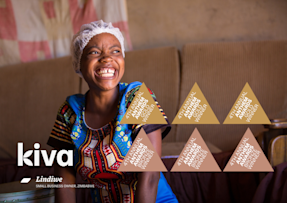
A mark of a truly impactful organization is the ability to influence multiple aspects of a community’s well-being with one action. iDE Ghana is aiming to do just that, with an unlikely tool: toilets!
The nonprofit works in the rural regions of northern Ghana to help improve financial access, nutrition, gender equality, resilience to climate change and sanitation.
Kiva recently partnered with iDE Ghana to implement the SAMA SAMA toilet project, which aims to distribute 61,560 toilets to 3 of the most marginalized regions of northern Ghana by 2020.
One way the program will increase scalable, affordable sanitation products in the area, such as pour-flush toilets, is by training local entrepreneurs to manufacture, design and sell these products themselves. The hope is that in doing so iDE Ghana will increase formal employment opportunities, foster entrepreneurship and have a positive impact on the communities’ health and environment.
When toilets aren’t available, communities often use a pit in the ground, resulting in human waste mixing with the environment and contaminating local water sources. This can cause waterborne diseases such as diarrhea and lead to cases of malnutrition.
Only 9.6% of households in rural Ghana have improved toilet facilities, according to the 2014 Domestic Household Survey in Ghana, whereas 34.4% of households have no facilities whatsoever. These demographics represent the significant need for more hygienic technology and infrastructure that iDE works to fulfill.
So far, iDE Ghana has successfully recruited over 100 clients and provided loans to 68 borrowers for pour-flush toilets since the project’s inception in 2016. Similar to Kiva’s mission, iDE Ghana finds that providing loans to buy these products has a much greater effect on adoption of the new technology compared to simply donating the products.
In addition, iDE Ghana uses a user-tested strategy to encourage adoption of the sanitation systems that incorporates the cultural and environmental context of northern Ghana. Measurement, evaluation and learning teams make this strategy possible by continuously collecting data and maintaining a long-term relationship with the community in order to deeply understand its needs.
It is through these strategies that Kiva and its amazing partner, iDE Ghana, hope to serve as a catalyst for increased health and sanitation for our Ghanaian friends in East Africa.
To learn more about iDE Ghana and its lending approach, click here.
To learn more about iDE Ghana and its lending approach, click here.
PREVIOUS ARTICLE
An unexpected party in Tajikistan →NEXT ARTICLE
The ice cream business with scoops of heart, family and hard work →














